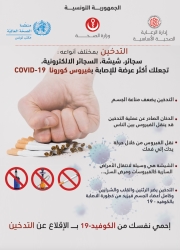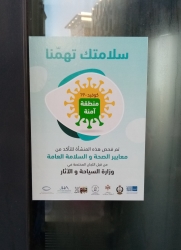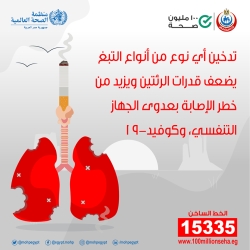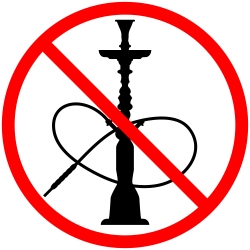Tunisia successfully bans waterpipes and creates national awareness during COVID-19
Introduction
 Tunisia’s Ministry of Health is ramping up health awareness activities in response to the COVID-19 pandemic. The Ministry is focusing on two main areas within tobacco control: enforcing a ban on waterpipe use in public places and a national awareness campaign.
Tunisia’s Ministry of Health is ramping up health awareness activities in response to the COVID-19 pandemic. The Ministry is focusing on two main areas within tobacco control: enforcing a ban on waterpipe use in public places and a national awareness campaign.
Ban on waterpipes in public places
Following a recommendation by the Ministry of Health, Tunisian Municipalities during the first ten days of March 2020 issued a decision banning waterpipes in all restaurants and cafés. Following the ban, there was a decision to close all cafés in the period from 20 March 2020 till 4 June 2020. Currently, customers are served drinks without being seated and the ban on waterpipes continues. Dr Faiçal Samaali, Tobacco Control Focal Point at the Ministry of Health stated: “We are really trying to make use of the period of COVID-19 to ban smoking in general as well as the ban on waterpipe use”.
Recognition of World No Tobacco Day and linking its activities to COVID-19
To coincide with World No Tobacco Day 2020, Tunisia’s National Anti-Tobacco Programme launched a national awareness campaign in cooperation with the World Health Organization (WHO), United Nations Children's Fund (UNICEF) and other UN agencies. The campaign, which focused on linking tobacco use to the transmission of the virus that causes COVID-19, had the slogan of “Protect yourself from COVID-19 by quitting smoking”. The campaign utilised various materials, posters and a paper to the media disseminated through social media, radio and television. Key television programmes hosted Dr Faiçal in interviews to advocate tobacco cessation. The campaign posters were distributed and displayed inside of buses, bus stations, mosques and workplaces across Tunisia. In addition, the Department of Primary Healthcare at the Ministry of Health prepared a paper to the media under the same slogan as the campaign. The paper covered the background to COVID-19 highlighting the numbers of deaths caused by it; the paper also highlighted how smoking contributes to the spread of the virus that causes COVID-19 and how quitting smoking can protect from contracting the virus.
Way forward
A multisectoral committee is continuing to monitor the COVID-19 developments and since 14 June the lockdown restrictions have been lifted totally. The Health and Safety Department at the Ministry of Health has developed a protocol to protect workers in cafes if they resume serving waterpipes. The National Programme for Anti-Tobacco has requested from the Ministry of Health to approve the deployment of 400 health inspectors to monitor the ban on waterpipes. On its part, the Ministry of Health has addressed His Excellency the Minister of Interior to enforce the implementation of Law 17 (1998) on Protection Against the Dangers of Smoking and Order 2248 (1998) specifying places for collective use in which smoking is prohibited.
The Ministry of Health’s National Observatory for New and Emerging Diseases is working with WHO to administer a survey covering 1050 cases. The survey aims at gathering data to provide additional evidence for studies on the link between tobacco use and the transmission of the virus that causes COVID-19.
Related links
Linking tobacco use to the transmission of the virus that causes COVID-19 (YouTube)
Tunisia’s Ministry of Health website
Update about COVID-19 developments on news aired on channel El Watania 1 on 1 June 2020 (YouTube)
Jordan successfully bans waterpipes, adapts smoking cessation services and establishes partnerships during COVID-19
Introduction
 The Jordanian National Epidemics Committee and Ministry of Health are leading the efforts to respond to the COVID-19 pandemic. Jordan’s Ministry of Health is focusing on three main areas within tobacco control: enforcing a ban on waterpipe use in public places, adapting smoking cessation services and establishing partnerships to provide nicotine replacement therapy.
The Jordanian National Epidemics Committee and Ministry of Health are leading the efforts to respond to the COVID-19 pandemic. Jordan’s Ministry of Health is focusing on three main areas within tobacco control: enforcing a ban on waterpipe use in public places, adapting smoking cessation services and establishing partnerships to provide nicotine replacement therapy.
Ban on waterpipes in public places
His Excellency Mr Omar Razzaz, the Prime Minister of Jordan, on 14 March 2020, issued a decision banning waterpipes in restaurants and cafés. Following this decision and within 48 hours, a full lockdown was announced, which helped implement the decision fully. The ban has continued indoors in public places till the restrictions due to the pandemic relaxed towards the end of April and internal tourism began to pick up.
The Ministry of Health, as of 25 June 2020, requested from ministries of interior, local administration, tourism and antiquities, environment, trade and industry, and the Mayor of Amman to ensure that smoking in all forms is banned 100% indoors in all public places according to Articles 52 and 53 of the Public Health Law.
The Ministry of Tourism and Antiquities has issued the Guide for Health and Safety Precautionary Measures in Touristic Establishments. The guide includes, amongst other measures for touristic establishments, standards to serve waterpipes in touristic establishments. These standards include serving waterpipes outdoors, sanitizing the waterpipe, use of personal or disposable waterpipes and ensuring that staff and workers are wearing appropriate protective gear and are free of COVID-19 through checking their temperature daily. Establishments which do not meet these standards are faced with grave penalties, while establishments which meet all standards are recognized by a sticker displayed in a prominent place. His Excellency the Prime Minister has directed the formation of the Joint Committee for Awareness, Guidance and Monitoring of Touristic Establishments, with a number of ministries represented and supported by the tourism police. The Joint Committee is tasked with monitoring and ensuring that touristic establishments meet the various standards outlined in the tourism law. In addition, the Ministry of Health has established a separate Committee for non-touristic establishments which serve waterpipes and are not categorized as touristic establishments to ensure that all establishments are covered by inspections.
Currently, the use of waterpipes indoors is still banned; however, they are being served outdoors and in open places. The Joint Committee has formed five teams tasked to carry out daily inspections across the Kingdom. The teams inspect and check that general health and safety precautions are in place including the use of waterpipes. Where the teams identify violations, they tackle them immediately and impose fines and closures as needed.
Adapting smoking cessation services
Jordan’s Ministry of Health in cooperation with the World Health Organization (WHO) has established a hotline for smoking cessation counselling. The hotline serves as a hub where phone inquiries are addressed by physicians from the Ministry of Health. These physicians have been trained by WHO on counselling and treatment for cessation. The hotline has been publicized widely on the Ministry of Health’s website and its social media platforms. Linked to this, the Ministry of Health launched a huge campaign for health awareness in the week prior to World No Tobacco Day 2020 on social media and television and promoted the hotline widely.
Establishing partnerships to provide nicotine replacement therapy
The Ministry of Health in collaboration with WHO has secured a donation of 80 000 Euros worth of nicotine replacement therapies. The partnership—currently in the process of approval by His Excellency the Jordanian Prime Minister—with Johnson & Johnson Consumer Health will secure 37 800 nicotine patches for the Ministry of Health cessation centres and clinics. This donation will help 5400 people quit smoking. It will be extended to partner centres and clinics such as universities which—in spite of having trained physicians—are unable to provide nicotine replacement therapy due to its high cost. The Ministry of Health is working closely with WHO to develop an implementation plan for this partnership. The plan will cover how best to work with different stakeholders: universities, nongovernmental organizations, and, UN agencies such as UNRWA and UNHCR to maximise the benefits from the partnership and extend into different groups in the society such as Palestinian and Syrian refugees.
WHO, on 10 July 2020 in Geneva, held a live press conference to launch WHO Access Initiative for Quitting Tobacco. In this press conference, Jordan was recognised and presented as the first pilot country with an innovative programme to quit smoking and reduce the risk during COVID-19. Jordan was the first country in the world to receive the donation from Johnson & Johnson Consumer Health during the time of COVID-19.
In addition, the Ministry of Health in collaboration with WHO, together with the Spanish Cooperation have managed to secure funds to integrate cessation services into primary health care.
Way forward
The Jordanian National Plan for Preparedness and Response to COVID-19 includes tobacco control with a focus on cessation, awareness and communication activities. The Ministry of Health together with a team of WHO experts and consultants (tobacco, mental health and noncommunicable diseases), are working together to ensure that all essential health services will be functioning properly after the pandemic subsides and also in the unlikely event of another outbreak.
The Ministry of Health, supported by WHO, is looking at ways to utilise effectively 15 trained family physicians from the King Hussein Cancer Centre. Currently, there are five clinics and the Ministry of Health is looking at ways to further expand clinics and services and integrate them into primary health care.
Future plans include the close coordination between WHO and the Ministry of Health to clarify the position of smoking indoors in regulations, as currently, waterpipes are the only tobacco product banned indoors. This continues to represent a challenge for effective tobacco control. The Ministry of Health has approved the implementation plan for the WHO Framework Convention on Tobacco Control (FCTC) 2030 project. The FCTC 2030 project supports Parties eligible to receive official development assistance to achieve the Sustainable Development Goals by accelerating the implementation of the WHO FCTC. In addition, a study has been completed to propose changes to the General Health Law.
Related links
Jordan’s Ministry of Health (Facebook)
Jordan’s Ministry of Health (Website)
WHO and partners to help more than 1 billion people quit tobacco to reduce risk of COVID-19
Egypt bans waterpipes and ramps up health awareness during COVID-19
Introduction
 The Government of Egypt has setup the Higher Committee for Novel Coronavirus Crisis Management in response to the COVID-19 pandemic. The Committee is tasked with following-up on the implementation of precautionary measures to face the COVID-19 pandemic and develop emergency plans to address any situation arising during the crisis. The Ministry of Health and Population is ramping up health awareness activities during this critical period. Tobacco control was among the priority COVID-19 relevant awareness areas, focusing on a number of tobacco control interventions, such as: enforcing a ban on waterpipes (locally known as shisha) use in public places, running awareness campaigns on deleterious health impact of tobacco use especially during the pandemic, renewing pictorial health warnings on all tobacco products, finalizing the review of tobacco control law and approving accession of Egypt to the WHO Framework Convention on Tobacco Control Protocol to Eliminate Illicit Trade in Tobacco Products.
The Government of Egypt has setup the Higher Committee for Novel Coronavirus Crisis Management in response to the COVID-19 pandemic. The Committee is tasked with following-up on the implementation of precautionary measures to face the COVID-19 pandemic and develop emergency plans to address any situation arising during the crisis. The Ministry of Health and Population is ramping up health awareness activities during this critical period. Tobacco control was among the priority COVID-19 relevant awareness areas, focusing on a number of tobacco control interventions, such as: enforcing a ban on waterpipes (locally known as shisha) use in public places, running awareness campaigns on deleterious health impact of tobacco use especially during the pandemic, renewing pictorial health warnings on all tobacco products, finalizing the review of tobacco control law and approving accession of Egypt to the WHO Framework Convention on Tobacco Control Protocol to Eliminate Illicit Trade in Tobacco Products.
Ban on waterpipes in public places
The Egyptian Ministry of Local Development issued a statement, on 15 March 2020, to all governorates covering the precautionary measures to prevent the spread of COVID-19 as per the Ministry of Health and Population and the World Health Organization (WHO) recommendations in this regard. On the top of these precautionary measures was banning waterpipes in all cafés. In the first few days of implementing the ban, there were some violations which were met with hefty fines reaching up to 40 000 Egyptian Pounds (USD 2500), closures and confiscation of waterpipes. Shortly after the ban, cafés were closed due to lockdown restrictions. Currently, cafés have reopened with social distancing rules and a capacity of 50%, however, the ban on waterpipes continues.
Awareness campaigns during COVID-19
The Ministry of Health and Population has run a nationwide campaign on awareness and precautionary measures to curb the spread of COVID-19. Part of this campaign was directed at highlighting the link between tobacco use and the transmission of the virus that causes COVID-19. Within this campaign, the Ministry used its social media platforms and mobile application, Egypt Health (Sehat Masr), to disseminate its messages widely.
In tandem, the Ministry of Social Solidarity in collaboration with WHO, ran a campaign featuring celebrities in short videos focusing on banning waterpipes. The campaign highlighted the relationship between the use of waterpipes and the spread of COVID-19, calling on individuals to abstain from waterpipe use to protect themselves from the risk of infection. The Ministry disseminated these videos widely on social media platforms.
The Ministry of Health and Population has mitigated misinformation promoted by tobacco companies which claimed that smoking protects individuals from contracting the virus that causes COVID-19. The Ministry put out information clarifying the falseness of these claims to the public. In addition, the Ministry of Health and Population, through its tobacco control focal points spread across the 27 governorates, has managed to run awareness sessions on COVID-19 and the risks associated with smoking. These sessions have been very successful and contributed to curbing the spread of COVID-19 across Egypt.
Renewing pictorial health warnings
The Ministry of Health and Population has worked closely with WHO to select the new set of pictorial health warnings that will be placed on all tobacco products, in line with requirements of the WHO Framework Convention on Tobacco Control in the next two years. The set consists of four well selected pictures that can be adopted and applied on all forms of tobacco products, including heated tobacco products, according to the latest developments in this regard in the Egyptian market.
The new pictorial health warnings will occupy a space of 50% of the display area of the tobacco product pack, which is higher than the typical 30%. They will come into effect as of 1 January 2021, with a grace period of 6 months within 2020, for tobacco companies to allow them to use up their stocks.
Finalizing the review of the national tobacco control law
WHO has worked closely with the Ministry of Health and Population to revise the national tobacco control Law and propose the needed various amendments, which can have a significant impact on the prevalence of tobacco use in the country. The law has been revised by a legal expert to address existing gaps and ensure that it is comprehensive as outlined in the WHO Framework Convention on Tobacco Control. The legal expert will also propose a bylaw and a national strategy on the mechanism for implementing these amendments.
In conjunction with this, WHO in cooperation with the Ministry of Health and Population has successfully completed a limited survey about compliance with tobacco control legislations.
Approval of the Protocol to Eliminate Illicit Trade in Tobacco Products
After several years of joint multisectoral collaboration between Ministry of Health and Population, Ministry of Trade and Industry, Customs Authority and WHO three levels, the Egyptian Cabinet has approved the Protocol to Eliminate Illicit Trade in Tobacco Products after His Excellency President Abdel Fattah Al-Sisi approval. The Protocol will help to eliminate illicit trade in tobacco products which will protect Egyptian population health and economy from the deleterious consequences of illicit trade.
The Protocol has been discussed in a special session by the Egyptian Parliament and consensus of approval has been reached. Following this, the Egyptian Mission in New York will sign the Protocol on behalf of Egypt. Egypt will be the seventh country in the Region to get accession and enter into signatory.
Way forward
Future plans include submitting these amendments, bylaws and national strategies for Her Excellency Minister of Health and Population for her approval and start of implementation. Also translating the same documents into English in order to share them with WHO Framework Convention on Tobacco Control experts for their views. There are plans in place to create a platform for the Egyptian Observatory for the Tobacco Industry. This platform will ensure that the activities of the Observatory are sustained and will enable the effective monitoring of the tobacco industry’s tactics. Moreover, there are plans to support tobacco cessation clinics all over the country in collaboration with the Ministry of Health and Population to encourage tobacco users to quit in this critical time.
Related links
Egypt’s Ministry of Health and Population
Egypt’s Ministry of Health and Population (Facebook)
Lebanon bans waterpipes and adapts smoking cessation services during COVID-19
Introduction
 Lebanon’s Ministry of Public Health has intensified its health awareness activities, in response to the COVID-19 pandemic. The Ministry has setup a Crisis Committee Chaired by His Excellency the Minister of Public Health. The Ministry has launched a mobile application to update the public about the latest COVID-19 related information and health awareness data. The Ministry is focusing on two main areas within tobacco control: enforcing a ban on waterpipe use in public places and adapting smoking cessation services. The Ministry has been leading the efforts of tobacco control through close coordination with the ministries of interior, tourism, media, justice, economics and finance and municipalities.
Lebanon’s Ministry of Public Health has intensified its health awareness activities, in response to the COVID-19 pandemic. The Ministry has setup a Crisis Committee Chaired by His Excellency the Minister of Public Health. The Ministry has launched a mobile application to update the public about the latest COVID-19 related information and health awareness data. The Ministry is focusing on two main areas within tobacco control: enforcing a ban on waterpipe use in public places and adapting smoking cessation services. The Ministry has been leading the efforts of tobacco control through close coordination with the ministries of interior, tourism, media, justice, economics and finance and municipalities.
Ban on waterpipes in public places
A ban on waterpipe use in restaurants and cafés has been implemented during the lockdown period. Lebanon’s Ministry of Public Health has enacted Law 174 and issued memo No. 48/2020 to ban waterpipes in public places, especially restaurants and cafés, as a preventive measure to prevent infection with COVID-19. Lebanon’s Ministry of Public Health together with the Ministry of Interior and Ministry of Tourism, are enforcing the ban. The law, which has been in place for years, is only now being implemented across Lebanon. Mr Fadi Snan, Director of National Tobacco Control Programme at the Ministry of Public Health stated: “COVID-19 helped us implement the law”.
Health inspectors are sent out on a regular basis to check that the ban is being implemented in restaurants, cafés and closed places where waterpipes and tobacco products are served. In cases of violations, the inspectors liaise with the ministries of interior and justice. Violations are met with hefty penalties, such as fines and in the cases of repeat violations, venues are shut down.
Enforcement of the waterpipe ban has been met by some resistance from restaurants and cafés, which consider waterpipes to be the lucrative part of their business. They are lobbying through the Lebanese Regie for Tobacco (Régie Libanaise des Tabacs et des Tombacs) for waterpipes to be allowed in open places, especially those with swimming pools as soon as the lockdown restrictions are relaxed. Economic factors have also facilitated the implementation of the ban, especially the value plunge of the Lebanese pound against the U.S. Dollar, which has created a steep rise in prices of imported tobacco products three-fold. The ban on waterpipes has continued during the initial period after the lockdown, however, using waterpipes in the privacy of homes especially by youth still poses a challenge.
Adapting smoking cessation services
Lebanon’s Ministry of Public Health is working closely with seven cessation centres across Lebanon. The Ministry is publicising the services of these centres through their website and centres are providing their services at a reduced fee for patients coming through the Ministry website. Providing tobacco cessation medications represents a challenge due to the difficulty to supply them within lockdown restrictions, so many of the centres are providing medication-free treatment plans or focusing more on psychological support. A cessation hotline (1214) is available and publicized widely for any tobacco cessation related enquiries. This year on World No Tobacco Day, the Ministry publicized widely on its website and social media platforms the link between smoking and COVID-19, using World Health Organization videos and materials which highlighted that smokers come from all walks of life.
Way forward
The Government of Lebanon has developed a country-wide five-phase transition plan to start lifting coronavirus restrictions and eventually return to normal activities, subject to the COVID-19 situation across the country. Currently, there is a ban in restaurants and cafes due to the COVID-19 situation in the country.
Related links
Official page for national tobacco control in Lebanon
Official page for national tobacco control in Lebanon (Facebook)
The new version of Lebanon’s Ministry of Public Health mobile application








